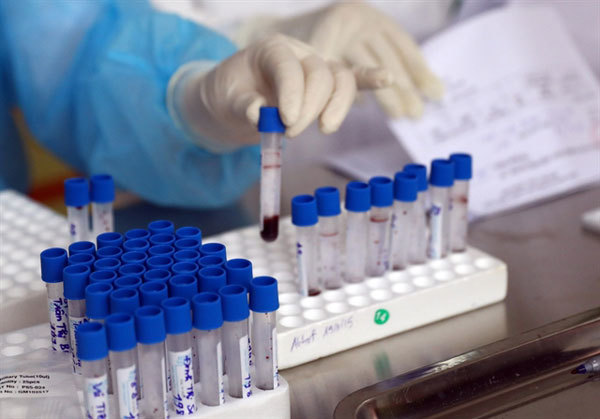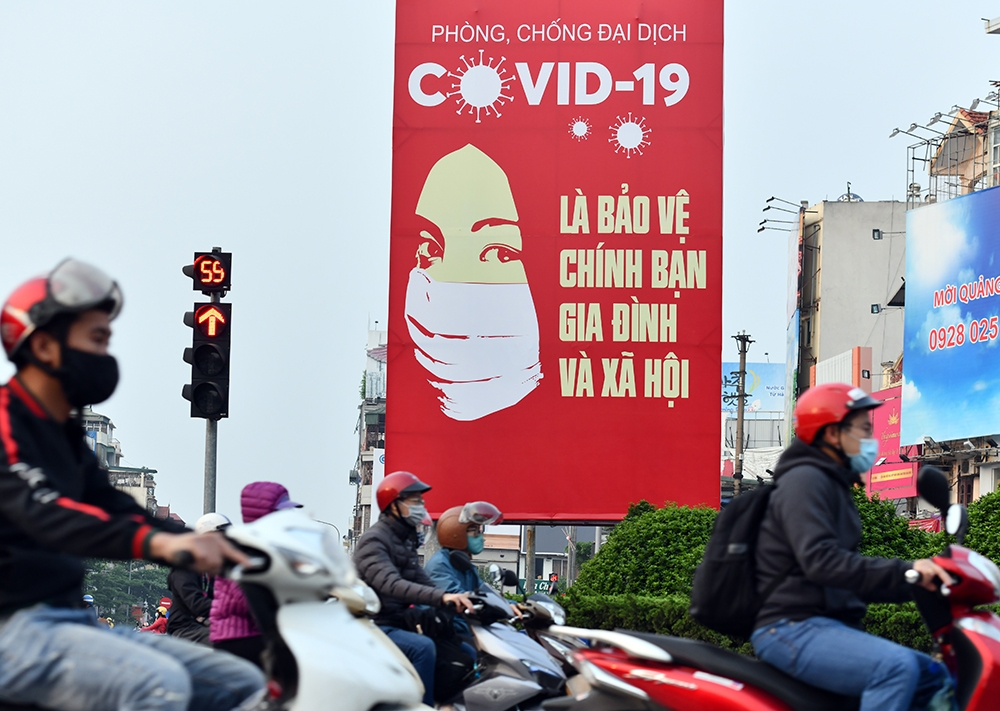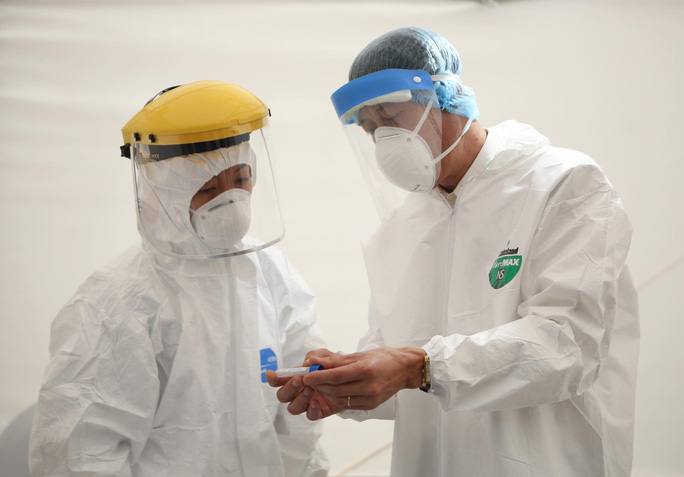 |
| Blood samples collected from workers and traders at Nga Tu So wholesale market in Hanoi on Sunday as part of the city's efforts to widen COVID-19 testing in the community. — VNA/VNS Photo |
The participants will be given at random a dose of Bacille Calmette-Guérin (BCG) vaccine – developed a hundred years ago to combat tuberculosis – to confirm reports suggesting the vaccine might provide protection against the worst effects of the novel strain of coronavirus (SARS-CoV-2), as the entire world is desperate for treatment method against the unprecedented pandemic.
The plan by Vietnamese health authorities was put in motion after a US study proposed there might be a meaningful correlation between a country’s COVID-19 caseload and death rate and whether that country has conducted universal BCG childhood vaccination.
“We found that countries without universal policies of BCG vaccination, such as Italy, the Netherlands, and the United States have been more severely affected compared to countries with universal and long-standing BCG policies,” the researchers state.
Vietnam's Ministry of Health has commissioned the National Lung Hospital and the National Institute Of Hygiene And Epidemiology to carry out the research into the alleged correlation, within the context of Vietnam, where the vaccine is universally available and mandatory.
Professor Nguyen Viet Nhung, Director of Vietnam National Lung Hospital, said that the hospital has submitted an outline of the plan to the Ministry of Health, pending approval.
The hypothesis is that BCG vaccine "is not working specifically to prevent infections of tuberculosis, flu or COVID-19," but it has a "harmonising effect" that can direct the immune system to respond "at the right level" to SARS-CoV-2, Professor Nhung told Vietnam News Agency.
He cited the acute case of the 43-year-old British pilot currently undergoing treatment in Việt Nam for COVID-19, saying that while the patient was a perfectly healthy male, his condition had deteriorated dangerously and unpredictably due to his own body's defence mechanism's overreaction to the coronavirus.
He was referring to earlier reports in which the country's leading doctors in the field, who have been watching over his health condition via telehealth format, confirmed that the amount of cytokine that the patient's immune system secreted to combat the virus was too much, causing damage to his own internal organs and functions, in a phenomenon known as a "cytokine storm."
The professor emphasised that the hypothesis remains purely "observational", and confirmation can be obtained via clinical trials.
He said that the plan might be undertaken in two directions.
First, it could be a clinical trial with the involvement of Vietnam, Cambodia and France, designed to see whether the BCG vaccine could help protect high-risk health workers against COVID-19.
800 Vietnamese health workers together with 400 from Cambodia and 1,000 from France will be participating in this plan if it goes through.
The participating doctors and nurses are mostly from the National Hospital for Tropical Diseases in Hanoi and the HCM City Hospital for Tropical Diseases – where many of the COVID-19 patients recorded in Vietnam have been or are being treated.
Second, health experts could just conduct an evaluation on the pool of COVID-19 patients recorded in Vietnam and compare the conditions between those who have been vaccinated with BCG and those who haven't. The immunised group is supposed to have quicker recoveries and fewer critical cases than the non-immunised group.
Caution urged
Nguyen Ngo Quang, Vice Director of the Administration of Science, Technology and Training under the Ministry of Health, stressed that all medical studies involving humans must be reviewed and approved by the ministry's ethics committee.
The BCG vaccine has been included in Vietnam’s national expanded programme of immunisation since 1985.
Vietnam is currently capable of producing the vaccine domestically and is providing it for free under the immunisation programme for all one-year-olds.
Six countries in the world are reportedly conducting the trial, including Australia and the Netherlands.
Professor Nhung however cautioned the public not to act unwisely on the fear and inject BCG on their own without professional supervision.
"Even if the study is underway, the vaccines must not be given indiscriminately to adults. Japan has seen cases of adolescents suffering from complications after being given a dose of BCG vaccine in an attempt to ward off COVID-19," he warned, adding that in Vietnam, BCG vaccine is recommended only for one-month-old to one-year-old babies.
Repeat shots are actually recommended against, especially in adults, he said.
Total reliance on the vaccine while failing to observe social distancing and proper hygiene measures like wearing masks and frequently washing hands would lead to a worsening outbreak situation, Professor Nhung said.
The World Health Organisation at the moment is saying that there has not been sufficient evidence proving that BCG vaccine can lower novel coronavirus infections, morbidity or the severity of the disease. VNS

Vietnam in the fight against COVID-19 pandemic
With the spirit of ‘fighting against the pandemic like fighting against an enemy’, the whole Vietnamese Party, armed forces and people have made an all-out effort to implement synchronous measures to prevent and combat the COVID-19 pandemic.

Vietnam seeking to work out BCG vaccine and Covid-19 connection
Around 800 medical staff in Vietnam will participate in a Bacillus Calmette–Guérin (BCG) vaccine used against tuberculosis in order to help find whether the vaccine can be useful in Covid-19 prevention.
 Up to 800 Vietnamese frontline healthcare workers have agreed to take part in a clinical trial designed to test the effectiveness of a tuberculosis vaccine against COVID-19.
Up to 800 Vietnamese frontline healthcare workers have agreed to take part in a clinical trial designed to test the effectiveness of a tuberculosis vaccine against COVID-19.